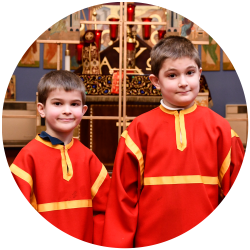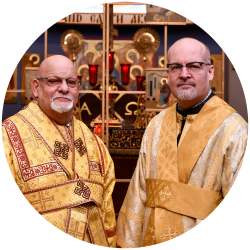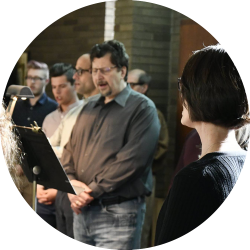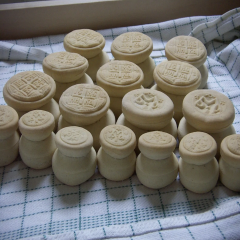Service to Christ and His Church are critial to the health of a parish and surrounding community. First and foremost our job is to pray. Second, we are to preach the Gospel and use words if necessary. By living our faith and being educated in our Faith, we can more effectively preach the Word to our community and bring Warren to Christ.
Here you'll find our current ministry groups that help us in our efforts to pray and serve our community. As time moves on, we hope to grow our ministry reach and be a strong presence in the community.
If you're interested in serving in any leadership or ministry position, please talk to Father Brian or send him a messaage via our Connect page!

An Altar Boy or Acolyte is someone who is privileged to serve in the Holy Sanctuary where the Holiest of the Holies are present and where the Lord dwells. The Altar Boy has received special permission to serve in the Holy Altar and to assist the priest in the celebration of the Divine Liturgy and other Holy Services. The Holy Sanctuary is a very sacred place in the Church and only the clergy and the Altar Boys are permitted to enter. No laymen or women are permitted entrance to the Holy Sanctuary. In order to assist the Altar Boy in the proper performance of his duties in the Holy Sanctuary, please visit our Servers Corner page (linked below) to view the Readers Schedule, along with more information about Serving.
If you're interested in becoming an Altar server, please talk to Father Brian or one of the sacristans. We will teach the children everything they need to know about serving!

There are many ways of serving in the Church, some of which include some type of blessing or ordination. Minor orders, taper-bearers, readers and subdeacons, are conferred through the form of blessing known as cheirothesia. This type always takes place both outside of the Divine Liturgy and outside of the Holy Place. Ordination to major orders, that is deacon, priest (or presbyter) and bishop, takes place specifically during the Divine Liturgy, within the Holy Place and specifically at the altar table. This type of ordination is known as cheirotonia. Both cheirotonia and cheirothesia mean “the laying on (or imposition) of hands,” but have very different implications.
Readers and subdeacons are blessed for specific parishes. When a reader or subdeacon is outside of his parish (such as on vacation or at a diocesan conference or gathering) he must receive permission of the bishop or proestamenos prior to serving. In case of a reader or subdeacon moving from one city and/or church to another, again, he must receive permission of the proestamenos prior to serving. There is no canonical transfer of readers or subdeacons as with deacons and priests.
Titles: Whereas bishops, priests and deacons are addressed by specific titles (Your Grace or Vladyka; Father; Father Deacon/Deacon), subdeacons and readers go by their “regular” name within the parish and diocese. They are given communion as “the Subdeacon N.” or “the Reader N.,” but do not use that at other times.
Cassocks: A cassock is worn by a subdeacon or reader when he is serving in the church temple. If for some reason a subdeacon is not serving in the altar, he does not wear a cassock or his vestments. If for some reason a reader is not serving at the chanter’s stand (or in the altar), he does not wear his cassock. A reader or subdeacon does not wear the cassock to coffee hour or at other church functions. Only the clergy, that is those in major orders (bishop, priest, deacon), may wear a cassock outside of the Church temple. At diocesan conferences, a subdeacon or reader only wears a cassock when serving in their specific role. Neither would wear a cassock while sitting with the congregation for a liturgical service. If serving at a conference, the cassock would be brought folded to the chapel and blessed by a priest or the bishop prior to donning (see below). The cassock is removed immediately after the service and not worn through the hallways of the hotel. The cassock (and sticharion and orarion for a subdeacon) is to be blessed by the priest (or bishop) prior to putting it on. This is the blessing to serve either as subdeacon or reader.
Ministry of Reader: A reader is one who serves as a psalti (chanter) and/or one who reads the Epistle and other scripture readings at the services. Thus, a reader must be familiar with the liturgical texts, able to read aloud well and to enunciate the words clearly for the congregation to hear and understand. A reader does not read in a dramatic or interpretive style. Readings in the Church are typically done in a simple and unadorned fashion.
Ministry of Subdeacon: The Subdeacon is a server in the altar. When the bishop is at the parish, he is typically assigned to carry the Dikeri and Trikeri, the pitcher and bowl, and/or the bishop’s staff. When a bishop is not present, he may serve as an altar server.
Description coming soon!

"Those who chant in the churches should refrain from forcing their nature to yell, but also from saying anything else that is unsuitable for the church."
— Canon LXXV of the Sixth Ecumenical Synod
"Those who chant should offer their psalmodies with great care to God, Who looks into the hidden recesses of the heart, i.e., into the psalmody and prayer that are done mentally in the heart rather than uttered in external cries."
— Canon LXXV of the Sixth Ecumenical Synod
"The chanting that is done in churches is an entreaty towards God to be appeased for our sins. Whoever begs and prayerfully supplicates must have a humble and contrite manner; but to cry out manifests a manner that is audacious and irreverent."
— Canon LXXV of the Sixth Ecumenical Synod

Of all the things that we can do, the most essential are worshipping God and offering Him our prayer and thanksgiving. Having the opportunity to make Prosphora helps us in a focused way to worship, pray and offer thanksgiving. When we make Prosphora, which means offering or bringing, we are actively offering back to God, that which He has given us; and through the making of the bread we also offer thanksgiving, prayer and worship.
We offer thanksgiving by realizing that everything comes from God. The wheat, the salt, the yeast, the water and everything else we are blessed with, including our utensils, pans and ovens; without which we could not make our bread offering. We offer thanksgiving for having the willingness, the opportunity, the strength and the forcefulness to make the bread even when we are busy or tired, because it requires our will aligning with God’s will as an intentional, sacrificial response to do so.
We are offering prayer as we are making the bread. “Please Lord, help me to focus on You and what you have offered to me and all of humanity through this bread which will become your Body. Please Lord God, receive this bread from these unworthy hands which struggle to do any good thing on this earth. Please Lord, cover my sins as I am making this bread which will become your sinless Body. Please Lord Jesus, help me to knead in my love for you and that of my family, as we ever more deeply realize our great and endless need for You.”
We worship God through our willingness to glorify Him by preparing our Prosphora and offering it on behalf of ourselves, our family, and our entire church family. We worship God by acknowledging Him as Lord King and God, our Savior and Redeemer, our Light and Life. We worship God through our offering of the Prosphora themselves, because they would not be necessary if it were not for His sacrificial love and outpouring of Himself on the Cross for the salvation of myself, my family, my church family and for all of humanity.
How great is our God! He blesses us with the opportunity to use what He has given us, so that we weak sinners can offer it back to Him to be used in the Holy Offering of Himself as the Lamb, to be sacrificed for our sake. When the bread we offer is placed on the altar, it is we too who are placing ourselves on the altar of sacrifice, offering ourselves to God, giving Him our all to be used by God as He so deems. Not only myself and my family who have offered the Prosphora, but all of us in the congregation are being offered to God as a living sacrifice through this bread.
The placing of the Prosphora on the Paten is not just the bread my family is offering on behalf of the entire congregation, it is the bread that will be used for those faithful living and for those departed. The bread that is being offered will be used to offer the Lamb, the Holy Oblation. And, with the Lamb, an offering of the bread for the Theotokos, the Heavenly Host, all the Saints and all of the Kingdom on both sides of this life. The bread we bake and offer becomes the Lord’s Body and with the wine that is offered becoming His Blood, the Holy Chalice will contain our God and our Salvation! The very Body and Blood of Christ, will be given individually, by name, to each person who offers themselves before Christ Jesus as they approach the Holy Chalice.
And finally, the Prosphora we offer will allow the Priest of our Holy Orthodox Church to celebrate the Divine Liturgy; for without the bread we bake and offer, he could not celebrate the Divine Liturgy.
~ A Prosphora Baker
Taken from the website of St John the Baptist Greek Orthodox Church